Mcginty Surname Ancestry ResultsOur indexes 1850-1950 include entries for the spelling 'mcginty'. In the period you have requested, we have the following 13 records (displaying 1 to 10): Buy all | | | Get all 13 records to view, to save and print for £76.00 |
These sample scans are from the original record. You will get scans of the full pages or articles where the surname you searched for has been found. Your web browser may prevent the sample windows from opening; in this case please change your browser settings to allow pop-up windows from this site. Destitution in Donegal (1858)
Hearing of extreme distress in Gweedore and Cloughaneely in Donegal (including Tory Island), an investigation was made by a group of clergymen, gentlemen and newspaper reporters, who found a large part of the populace (800 families) to be in severe poverty - clad in rags, barefoot, living in mud hovels, without furniture, beds or bedding, and subsisting for much of the year only by scavenging seaweed and shellfish from the seashore - beset by rapacious landlords (with their apparatus of lawyers and bailiffs) raising their rents and confiscating the mountain lands on which the poor had relied for pasture. A parliamentary Select Committee was appointed to investigate: its report includes detailed minutes of evidence of their investigations, including testimony relating to many named individuals who had coped with the local crisis and survived, or those who died, and lists of those whose cases had been looked into. The landlords rebutted any suggestion of impropriety, suggesting that when the investigation was made 'a great deal was got up for the occasion' by an inherently dirty peasantry that kept their animals in their houses, in the hope of obtaining relief money (which, to the tune of £3,200, had been received, mainly from England). Seaweed was remarkably nutritious. It was remarked that 'some of the men go to England and Scotland to earn money' and that 'a few young people emigrate yearly to join their relations in America and Australia'.
MCGINTY. Cost: £8.00.  | Sample scan, click to enlarge

|  Outstanding soldiers of the 38th regiment of Foot
(1860-1870) Outstanding soldiers of the 38th regiment of Foot
(1860-1870)
The 35th (The 1st Staffordshire) Regiment of Foot embarked for India in 1857, after fighting in the Crimea. It was serving in India in 1860. It helped suppress the Indian Mutiny, took part in the capture of Lucknow, and returned to England in 1872: the regimental depot was at Colchester. Each year just a handful of outstanding soldiers of the regiment were chosen for good conduct medals and gratuities: these are listed here. There were two lists, one for men recommended for the Good Conduct Medal without a gratuity, and one for gratuities - £5 to a private, £10 to a corporal, and £15 to a serjeant. Both lists are indexed here, and each gives rank, name, regimental number, date of recommendation and date of issue. (The sample scan is from the 105th foot)MCGINTY. Cost: £8.00.  | Sample scan, click to enlarge
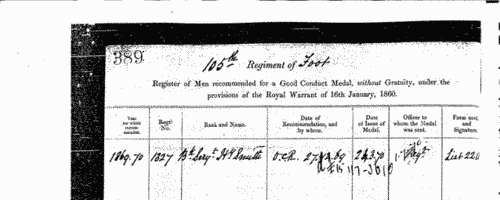
|  Men of the 40th Regiment who fought in the New Zealand War
(1863-1870) Men of the 40th Regiment who fought in the New Zealand War
(1863-1870)
New Zealand War Medal roll for the 40th (2nd Somersetshire) Regiment of Foot: for service in the New Zealand campaign 1863 to 1866: the rolls were compiled following a general order in 1869 and the medals were distributed in 1870. The regiment, although called the 2nd Somersets, was based at Birr in Offaly. It embarked for New South Wales 14 July 1852, and was moved to New Zealand in 1860; the men returned to England in 1866, and thence back to Ireland in 1869.MCGINTY. Cost: £8.00.  | Sample scan, click to enlarge

| Missing Next-of-Kin and Heirs-at-Law
(1880)
The Unclaimed Money Registry and Next-of-Kin Advertisement Office of F. H. Dougal & Co., on the Strand in London, published a comprehensive 'Index to Advertisements for Next of Kin, Heirs at Law, Legatees, &c., &c., who have been Advertised for to Claim Money and Property in Great Britain and all Parts of the World; also Annuitants, Shareholders, Intestates, Testators, Missing Friends, Creditors or their Representatives, Claimants, Unclaimed and Reclaimed Dividends and Stock, Citations, Administrations, Rewards for Certificates, Wills, Advertisements, &c., Claims, Unclaimed Balances, Packages, Addresses, Parish Clerks' Notices, Foreign Intestates, &c., &c.' The original list was compiled about 1860, but from materials dating back even into the 18th century: most of the references belong to 1850 to 1880. For each entry only a name is given, sometimes with a placename added in brackets: there may be a reference number, but there is no key by which the original advertisement may be traced. The enquirer of the time had to remit £1 for a 'Full and Authentic Copy of the Original Advertisement, together with name and date of newspaper in which the same appeared'. MCGINTY. Cost: £4.00.  | Sample scan, click to enlarge

|  Highland Light Infantry fighting in Egypt
(1882) Highland Light Infantry fighting in Egypt
(1882)
The war medal roll for the Egyptian campaign of 1882 is annotated to show those men actually present at Tel-el-Kebir, and thereby also entitled to the Tel-el-Kebir clasp. In addition, there follows an almost duplicate roll of men entitled to the Bronze Star granted by the Khedive of Egypt in recognition of the campaign. The 2nd battalion, The Highland Light Infantry, embarked for Egypt in 1882, took part in the battle of Tel-el-Kebir, and returned to England the following year. This medal roll was compiled in Cairo in November 1882.MCGINTY. Cost: £8.00.  | Sample scan, click to enlarge

| De Bernardy's Unclaimed Money Register
(1883)
This register is divided into three parts, under these headings:
1. 'Unclaimed Money. The following persons, or their representatives, are entitled to property'. This is the part covered by this index.
2. 'Australia. Unclaimed Money. The following persons, who went to Australia, if alive, or if dead their representatives, are entitled to property'. Australia is here understood to include New Zealand.
3. 'America. Unclaimed Money. The following persons, who went to America, if alive, or, if dead, their representatives, are entitled to property'.
In each case there then follows a list of names, alphabetical by surname (in capitals), and some brief circumstantial details, usually with a year, mostly from 1810 onwards, but with a handful of earlier instances. Anyone thinking they might have a claim to one of these estates was invited to send full details to Messrs De Bernardy Brothers, 28, John-street, Bedford-row, London, to further their claim.MCGINTY. Cost: £4.00.  | Sample scan, click to enlarge
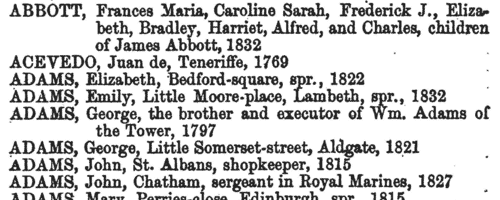
|  British artillerymen fighting in South Africa
(1899-1902) British artillerymen fighting in South Africa
(1899-1902)
The Queen Victoria's South Africa Medal was awarded (after her death, in the event) to all who had served honourably in the various campaigns in the Boer War. Returns were made from each unit, and consolidated into nominal roll, of which this is the one for the Royal Artillery. Confusingly, the ledgers used had originally been printed for a register of men transferred (or re-transferred after mobilization) to 1st Class Army Reserve. All the original column headings were therefore struck through, and the roll was prepared with this information: Date of Issue; Regimental Number; Rank; Name; Unit; Medal (a 1 indicating that a medal was awarded); [number of] Clasps; the reference to the source in the original returns, usually starting with AG for papers in the hands of the Adjutant-General, and 68/Art/ for the Royal Artillery records. The final column, normally left blank, was occasionally used for explanatory remarks.MCGINTY. Cost: £8.00.  | Sample scan, click to enlarge
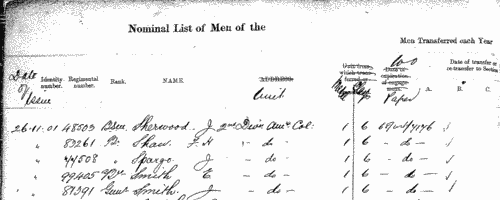
| Naturalizations
(1913)
The Home Office issued monthly lists of aliens to whom Certificates of Naturalization or Readmission to British Nationality had been granted by the Secretary of State under the provisions of 33 Vic. cap. 14 and been registered in the Home Office pursuant to the act during each previous month. These notices, from January to December 1913, refer to naturalizations from December 1912 to November 1913. The lists give full name, surname first; country of origin; date of taking the oath of allegiance; and place of residence. An asterisk indicates that the person was currently serving in a British ship.
MCGINTY. Cost: £6.00.  | Sample scan, click to enlarge
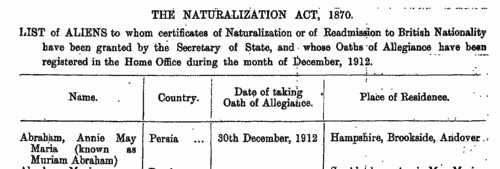
| Wanted by the police in Lancashire
(1923)
The Police Gazette was published by Authority by the London Metropolitan Police, and circulated, as confidential, to the police forces throughout Britain and Ireland. The contents were based on the information routinely submitted to the Criminal Record Office. One of the regular features was a section entitled Apprehensions Sought, in which each police force gave details of people for whom arrest warrants had been issued and were now on their Wanted list. The details given are: the name of the police authority (in bold) seeking an arrest; a brief description of the crime; the suspect's full name (in bold); C. R. O. number, year of birth, height, complexion, hair colour, eye colour, distinguishing marks such as scars; clothing &c. There then follows a resume of previous convictions. Variations of surname spelling and aliases are noted in the descriptions, and these variants and aliases have also been indexed.MCGINTY. Cost: £6.00.  | Sample scan, click to enlarge
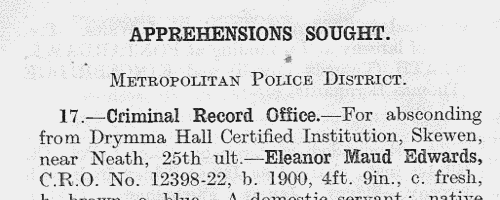
| Officers of the British Army and of the Indian Army
(1934)
The Half-Yearly Army List, issued By Authority, 30 June 1934, lists all officers in active service at that date, and this list was evidence of the status and rank of the officers contained in it. The entries are set out as a gradation list, by rank, from field-marshals to lieutenants, and within each rank in order of seniority at that rank. Each officer's name (surname first, in capitals, then christian name and present rank (with date of achieving that rank) and regiment &c. are given, for convenience, in bold type, with any national decorations in italics after the name. Each entry also gives date of birth, number of days service in the ranks, dates of service in each rank of officer, particular offices and postings (with dates) and, where appropriate, a summary of war service, and medals. For all but the oldest of the officers then serving, the war service details are for the Great War (1914-1921), and campaigns in Iraq, Waziristan, and the North West Frontier of India. War services are not given in this edition for Indian Army officers, except in that their entries are preceded by a crossed swords symbol where they have seen war service in a theatre of war overseas. After the gradation list of officers, there is a section for the Royal Malta Artillery; and then (pages 1152 to 1185) warrant officers - staff or garrison serjeant-majors, educational serjeant-majors, serjeant-major (physical training and educational) instructors, regimental serjeant-majors (and corporal-majors, farrier-serjeant majors, master gunners, assistant instructors in gunnery, experimental serjeant-majors, artillery clerks, farrier-serjeant-majors, artificer serjeant-majors, clerks of works, mechanist, superintending clerks, draughtsmen, 1st class staff serjeant-majors, transport, supply, conductors, sub-conductors, armourers, armament artificers, headmasters, schoolmasters, marine gunners, and bandmasters. The section for the Royal Army Chaplains' Department lists all chaplains (1st to 3rd class); and that for Queen Alexandra's Imperial Military Nursing Service has all matrons, sisters and staff nurses. The lists of nurses do not give date of birth: all are unmarried. The book concludes with the Yeomen of the Guard, the Honourable Company of Gentlemen-at-Arms, and the King's Body Guard for Scotland, in each case giving name (surname and initials, not christian names), honours, name of late regiment, and date of appointment.
MCGINTY. Cost: £4.00.  | Sample scan, click to enlarge
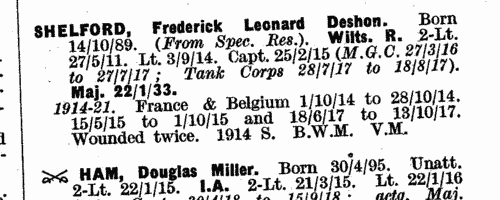
|
| 1 | 2 |  |
Research your ancestry, family history, genealogy and one-name study by direct access to original records and archives indexed by surname.
|













